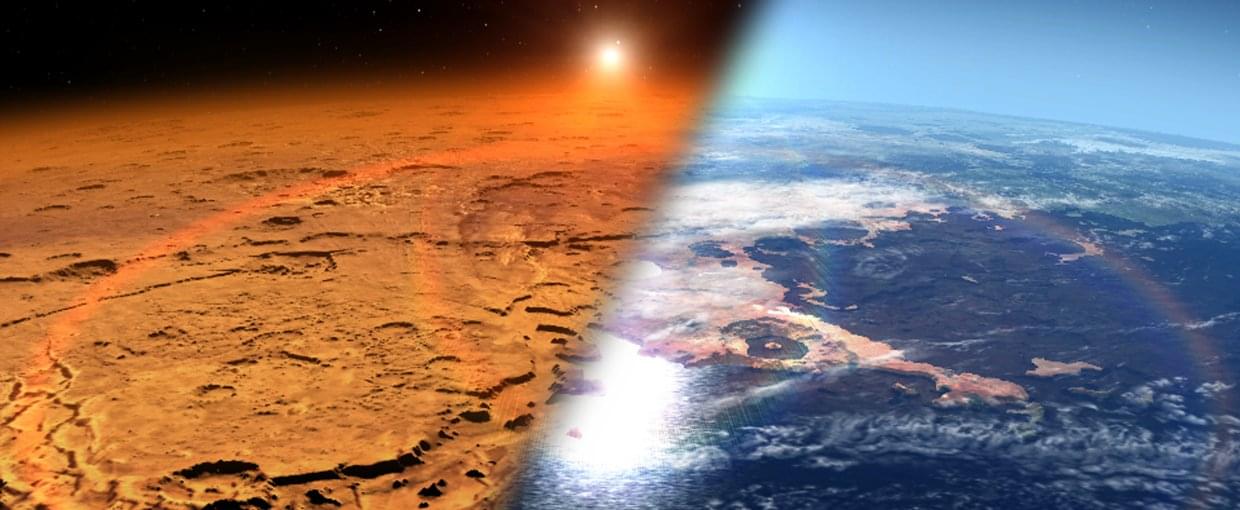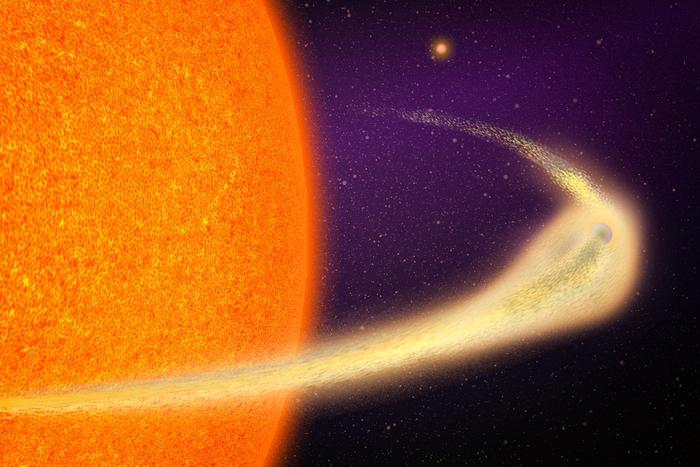How can astronomers develop better methods for blocking the intense starlight of an exoplanetary system and reveal the exoplanets hiding underneath the gla | Space




“This is a very tiny object, with very weak gravity, so it easily loses a lot of mass, which then further weakens its gravity, so it loses even more mass,” said Dr. Avi Shporer.
What can a planet that’s shedding its material teach astronomers about planetary formation and evolution? This is what a recently submitted study to The Astrophysical Journal Letters hopes to address as an international team of scientists investigated a unique exoplanet that orbits its host star approximately 20 times closer than Mercury orbits our Sun, resulting in the exoplanet shedding so much material that it’s creating a tail of debris and will eventually disintegrate into nothing.
“The extent of the tail is gargantuan, stretching up to 9 million kilometers long, or roughly half of the planet’s entire orbit,” said Dr. Marc Hon, who is a postdoc in the Kavli Institute for Astrophysics and Space Research at the Massachusetts Institute of Technology (MIT) and lead author of the study.
Exoplanet BD+054868Ab is located approximately 140 light-years from Earth and orbits its star in approximately 30.5 hours. For context, Mercury takes our Sun in 88 days. The orbit of BD+054868Ab is so close, astronomers hypothesize that it’s a molten world slowly shedding its material and they estimate it will be completely gone between 1 million and 2 million years from now. During its long and slow death, BD+054868Ab is shedding so material that it’s leaving a trail of debris in its wake, which initially puzzled astronomers after analyzing data obtained from NASA’s Transiting Exoplanet Survey Satellite (TESS).

Using NASA’s Transiting Exoplanet Survey Satellite (TESS), an international team of astronomers have detected a new sub-Neptune exoplanet orbiting a bright G-type star. The newfound alien world, designated TOI-3493 b is more than three times larger and about nine times more massive than Earth. The finding was reported in a research paper published April 17 on the preprint server arXiv.
To date, TESS has identified more than 7,500 candidate exoplanets (TESS Objects of Interest, or TOI), of which 620 have been confirmed so far. Since its launch in April 2018, the satellite has been conducting a survey of about 200,000 of the brightest stars near the sun with the aim of searching for transiting exoplanets—ranging from small, rocky worlds to gaseous giants.
TOI-3493, also known as HD 119,355, is a star of spectral type G1/2 V at a distance of some 315 light years away. Recently, a group of astronomers led by Priyanka Chaturvedi of the Thuringia State Observatory Tautenburg in Germany, identified a transit signal in the light curve of TOI-3493 with TESS. The planetary nature of this signal was confirmed by follow-up observations using ground-based facilities.

Researchers from the University of Science and Technology of China (USTC) achieved the first direct laboratory observation of ion acceleration through reflection off laser-generated magnetized collisionless shocks. This observation demonstrates how ions gain energy by bouncing off supercritical shocks, central to the Fermi acceleration mechanism. The research is published in Science Advances.
Collisionless shocks are cosmic powerhouses responsible for accelerating charged particles to extreme energies. This acceleration involves particles repeatedly crossing shock fronts, gaining energy incrementally. However, how do particles initially gain enough energy to enter this cycle? Two competing theories, shock drift acceleration (SDA) and shock surfing acceleration (SSA), have emerged, but observational limitations in space and previous lab experiments have left the question unresolved.
This new experiment, conducted at China’s Shenguang-II laser facility, recreated a controlled astrophysical shock scenario. Researchers used high-energy lasers to generate a magnetized ambient plasma and a supersonic “piston” plasma. When the piston collided with the ambient plasma at speeds exceeding 400 km/s, it produced a supercritical quasi-perpendicular shock, similar to those observed near Earth.

The juridical metaphor in physics has ancient roots. Anaximander, in the 6th century BCE, was perhaps the first to invoke the concept of cosmic justice, speaking of natural entities paying “penalty and retribution to each other for their injustice according to the assessment of Time” (Kirk et al., 2010, p. 118). This anthropomorphizing tendency persisted through history, finding its formal expression in Newton’s Principia Mathematica, where he articulated his famous “laws” of motion. Newton, deeply influenced by his theological views, conceived of these laws as divine edicts — mathematical expressions of God’s will imposed upon a compliant universe (Cohen & Smith, 2002, p. 47).
This legal metaphor has served science admirably for centuries, providing a framework for conceptualizing the universe’s apparent obedience to mathematical principles. Yet it carries implicit assumptions worth examining. Laws suggest a lawgiver, hinting at external agency. They imply prescription rather than description — a subtle distinction with profound philosophical implications. As physicist Paul Davies (2010) observes, “The very notion of physical law is a theological one in the first place, a fact that makes many scientists squirm” (p. 74).
Enter the computational metaphor — a framework more resonant with our digital age. The universe, in this conceptualization, executes algorithms rather than obeying laws. Space, time, energy, and matter constitute the data structure upon which these algorithms operate. This shift is more than semantic; it reflects a fundamental reconceptualization of physical reality that aligns remarkably well with emerging theories in theoretical physics and information science.


Prebiotic molecules central to life’s earliest metabolic processes—chemical reactions in cells that change food into energy—may have been born in deep space long before Earth existed, according to new research from the University of Hawaiʻi at Mānoa Department of Chemistry.
Scientists in the W. M. Keck Research Laboratory in Astrochemistry have recreated the extreme conditions found in dense interstellar clouds and discovered a way for the complete set of complex carboxylic acids—critical ingredients in modern metabolism—to form without life on timescales equivalent to a few million years.
The study, published in the Proceedings of the National Academy of Sciences, focused on molecules such as those in the Krebs cycle, a fundamental metabolic pathway used by nearly all living organisms. These molecules, which help break down nutrients to release energy, may have cosmic origins, forming in the icy, low-temperature environments of interstellar space.
A new analysis of the sky has finally confirmed where the missing half of the Universe’s visible matter has been hiding.
In the space around galaxies, it lurks as huge, invisible clouds of ionized hydrogen. Normally, this would be impossible to see – but a large international team of astronomers and astrophysicists has developed a technique that reveals its hiding places, out there in the darkness amidst the stars.
Survey programs confirm the missing half of the Universe’s material takes the form of an intergalactic mist of hydrogen expelled farther from the active cores of galaxies than anybody previously thought.

By breaking a decades-old paradigm and rethinking the role that the dimension of time plays in physics, researchers from the University of Rostock and the University of Birmingham have discovered novel flashes of light that come from and go into nothingness—like magic at first glance but with deep mathematical roots that protect against all kinds of outside perturbations. Their findings have now been published in the journal Nature Photonics.
Time is the strange dimension: Unlike its spatial siblings, it is a one-way street as the clock only ever ticks forward and never backward. Scientists have long been aware of time’s quirks, with the British astrophysicist Sir Arthur Eddington musing about this “arrow of time” in his 1927 lectures. Nevertheless, whether it be because of or despite its uniqueness, time as a dimension for physics to play out in has long received far less attention than space.
Recently though, rapid progress in the research on so-called spatiotemporal crystals, objects with repeating patterns in time and space, has inspired a rethinking of the role time should play in our understanding of physics. Additionally, this has spawned the question of whether the uniqueness of time can be more than a mere quirk and instead lead to new effects ultimately useful in applications.